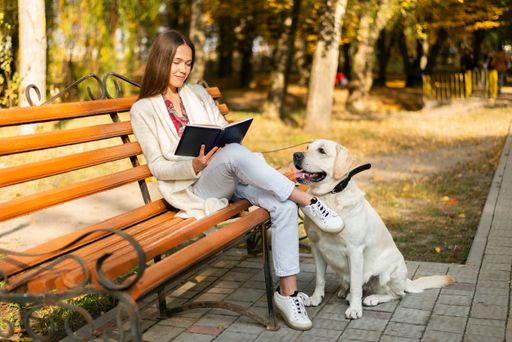Does your dog erupt in loud barking every time they see another dog or stranger approaching? These overexcited or fearful reactions can be frustrating and concerning if your pup is very reactive. Barking meltdowns happen for various reasons, but the good news is you can help your noisy pal learn to play nice with others through proper socialization and training.
This article will dive into tips to socialize your dog so they gain confidence around new sights, sounds, places, dogs, and people. With time and practice, you can teach your barky buddy to stay calm and make new friends!
Understanding Why Dogs Bark at Other Dogs and Strangers
Before jumping into socialization strategies, let’s do an overview of some common reasons dogs tend to aggressively or fearfully bark at unfamiliar people and pups:
- Lack of Early Socialization - Dogs that did not receive positive exposures to novel things between 7 weeks and 4 months old often grow up fearful and reactive. They bark to warn away perceived threats.
- Territorial Instincts - Some dogs bark excessively to guard their owner, home, or yard from "intruders" like strangers, delivery people, or other dogs.
- Overexcitement - For many exuberant pups, barking is simply an expression of extreme excitement at seeing someone new. Like a toddler squealing “Hi!” at everyone they see.
- Breed Tendencies - Certain breeds are predisposed to barking more than others. Herding breeds bark and “nip” at heels to herd. Watchdog breeds bark to alert their people. It's in their genes.
- Leash Frustration - Dogs feel more vulnerable on the leash and may bark defensively at dogs or people who approach. Allowing brief greetings helps this.
Whatever the root cause, consistent socialization, and positive training can help modify your dog’s barky behavior for the better. Let’s explore proven strategies for addressing excessive barking. Additionally, consider using the best dog muzzle can be beneficial in certain situations where managing your dog's barking is necessary.
Effective Socialization Techniques to Reduce Barking
Socializing an adult dog requires gradually exposing them to new environments, people, animals, sounds, and situations in a structured, rewarding way. This slowly builds their confidence and teaches them how to politely interact with strangers instead of barking. Here are some of the best techniques:
- Start Young If Possible - Socialization is easiest between 7 weeks and 4 months old when puppies are most open to new experiences. But don't worry, you can socialize adult dogs too. It just takes more time and patience.
- Introduce New Things Slowly - Don't overwhelm your dog by introducing too many new triggers too quickly. Start small with short sessions and gradually build up to more challenging interactions.
- Keep It Positive - Always make new experiences rewarding, not scary! Pair strangers and dogs with super tasty treats. Verbally praise calm behavior. Never punish fearful reactions.
- Practice Obedience Commands - Having your dog obey basic cues like “sit” and “watch” helps refocus their attention on you instead of barking at triggers.
- Allow Time to Warm Up - Some dogs need a few minutes to observe triggers from a distance before interacting directly. Forced greetings can make shy pups anxious.
- Enlist A Trainer If Needed - For severe fearfulness or aggression, seek help from a professional trainer experienced in canine behavior modification. Don't delay getting expert support.
With time, consistency, and positive reinforcement, you can modify your barky dog’s behavior for the better. But socialization is an ongoing process - your dog needs continued positive exposures to new things throughout their lifetime to stay comfortable and well-adjusted.
Fun Ways to Socialize Your Dog
Once your dog understands basic obedience cues, it’s time to get socializing! Try these rewarding ways to introduce your pup to new dogs and people:
- On-Leash Walks - Stroll past crowded areas like outdoor malls where strangers and dogs will routinely pass by from a distance. Offer treats for staying calm.
- Dog-Friendly Stores - Pet stores and outdoor home improvement stores often allow leashed dogs, providing great socialization opportunities.
- Group Training Classes - Specialized classes like agility training and flyball allow pups to playfully interact with new dog partners.
- Puppy and Doggy Daycare - Supervised playgroups help dogs burn energy and learn proper social skills. Look for facilities with thorough temperament testing.
- Parks and Beaches During Off-Peak Hours - Let your dog explore and play during less crowded times of day, allowing for successful interactions.
- Controlled Doggy Playdates - Invite calm, well-socialized friend dogs over for one-on-one play sessions to build confidence.
Always start new introductions slowly and end on a positive note before your dog becomes overwhelmed. Offer high-value treats and praise for polite behavior around triggers. With consistency over time, your dog will gain self-assurance and learn to love their new human and furry friends!
Conclusion
Don’t let your dog’s barky, overreactive tendencies discourage you just yet. With a customized socialization training plan catered to your pup’s needs, you have the power to help them keep their cool around new sights and sounds. While socializing, a dog takes patience and creativity, the payoff of a well-adjusted canine companion, is invaluable. So get ready to embark on positive new experiences together! Let the playdates and tail wags begin!


















